
The TV series "Mature Years" is adapted from Yi Bei's novel of the same name. Yi Bei's "Xiao Min's Home" was also adapted into a TV series of the same name. However, compared to "Xiao Min's Family", the novel "Mature Years" is more controversial. The main characters of "Mature Years" are generally not perfect, and the novel's values are also quite conservative. It can be summed up as "don't divorce if you can make do with life, and you can solve anything if you get pregnant". A lot of changes have been made in the series from the characters to the plot. It is recommended that the audience leave the novel and watch the series.
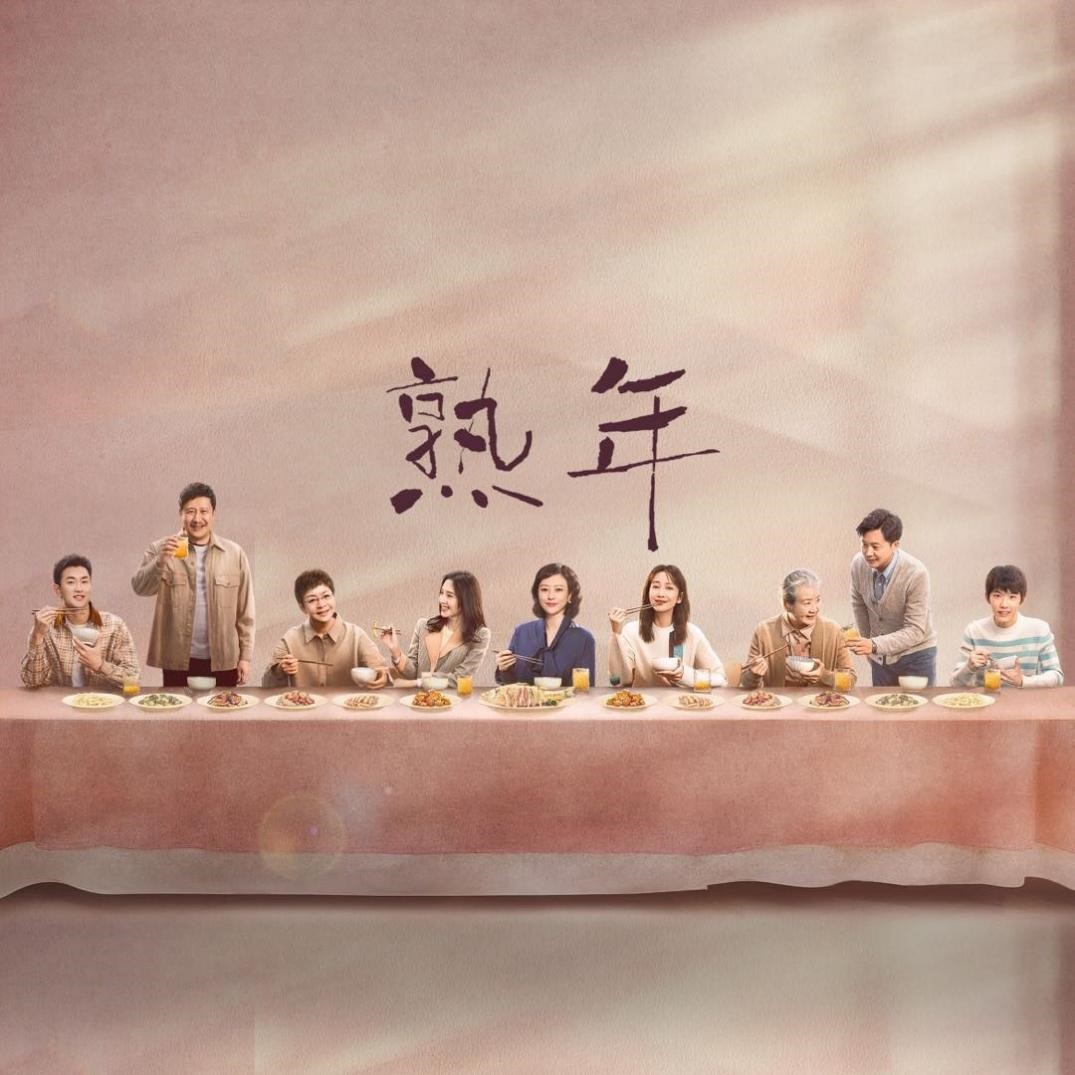
"Mature Years" poster
The lineup of the drama version "Mature Years" is quite attractive. The plot focuses on a family of three generations living under the same roof. The eldest in the family is Mrs. Ni (played by Cao Cuifen), who has three children. The eldest son Ni Weimin (played by Zhang Guoqiang), the eldest daughter-in-law Wu Erhu (played by Song Dandan), the second son Ni Weiqiang (played by Liu Yijun), the second daughter-in-law Zhang Chunmei (played by Hao Lei), and the third daughter Ni Weizhen (played by Wang Ou).
Ni Weimin and Wu Erhu's son Ni Jun (played by Wang Yanlin) are married, and Liu Hongyan (played by Tang Yixin) is Ni Jun's wife.
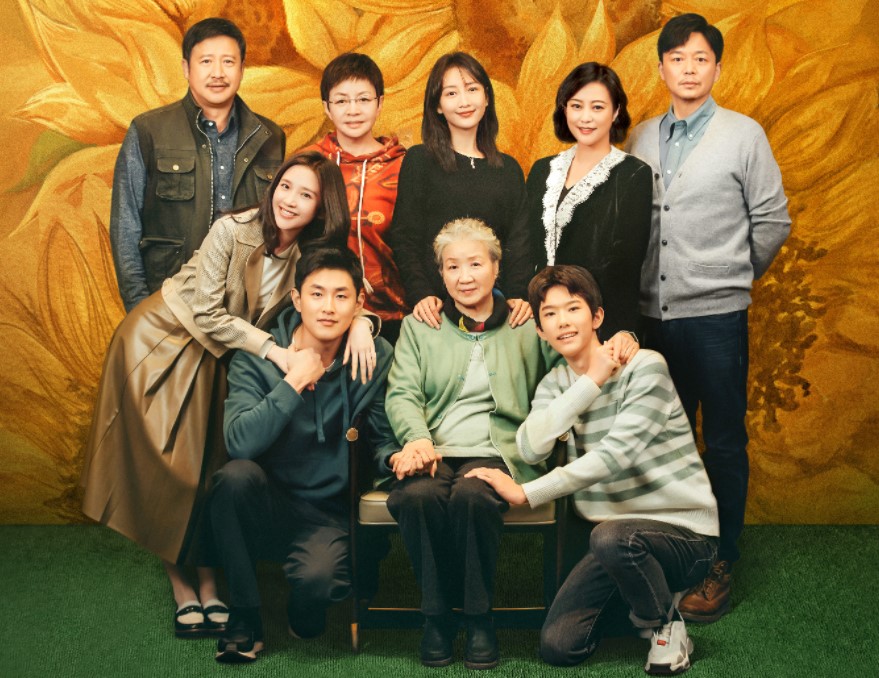
Ni family portrait
It is Zhang Chunmei who takes up the most space in the plot, and the title of the play "Mature Years" is also about the plight of people in Zhang Chunmei's age group. "Mature age" specifically refers to the ethnic group between the ages of forty and sixty-five. The maturity crisis is actually a "middle-age crisis". When people reach middle age, they will have a sense of confusion that they can't see the village and the store. Youth is gone, and the dead can't be chased. Everything that exists is boring, and the fear of old age and death often takes advantage of the gap. There will be a series of disintegrations in the sense of self, trust in life, and value beliefs. Therefore, the midlife crisis can point to some physical and specific work and life difficulties, and it often points to a spiritual crisis on the metaphysical level.
Zhang Chunmei's maturity crisis first came from her husband Ni Weiqiang's "disappearance" on her mother-in-law's birthday. When Zhang Chunmei took a lot of effort to find her husband, her husband suddenly filed for divorce. Not only Zhang Chunmei didn't understand, but the people around him didn't understand either. Ni Weiqiang, a majestic university professor, didn't work on the project. His life was over. If it wasn't for the mistress outside, what was the reason for his divorce.
In fact, Ni Weiqiang fell into a spiritual crisis. For a long time, Ni Weiqiang lived in the expectations of others and in the arrangements of Zhang Chunmei. He suddenly discovered that the past life was repetitive, monotonous, depressing and meaningless, and his mental crisis was getting deeper and deeper, so that he was on the verge of mental breakdown later on. So he Asked Zhang Chunmei for divorce.
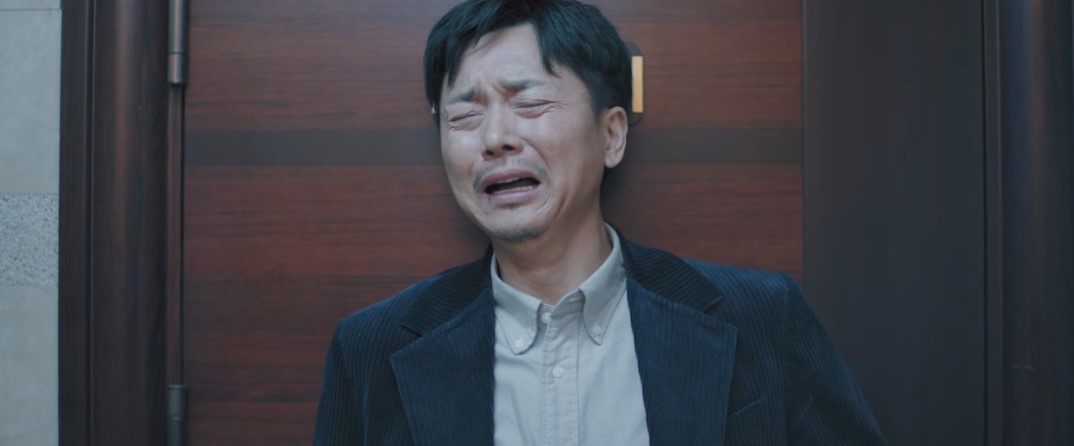
Liu Yijun's acting skills are very powerful, making Ni Weiqiang's mental crisis believable
The husband's mental crisis was a fuse, which directly ignited Zhang Chunmei's maturity crisis.
In the eyes of outsiders, Zhang Chunmei is a powerful woman that everyone envies. Externally, she is the deputy editor-in-chief of the magazine, with a successful career and a decent reputation; she has a happy and perfect family, her husband is a university professor, and her son is a student at a prestigious university. Internally, Zhang Chunmei is able to take care of this complicated big family in an orderly manner: she gets along very well with her mother-in-law, just like a mother and daughter; she also arranges all gatherings in the family...
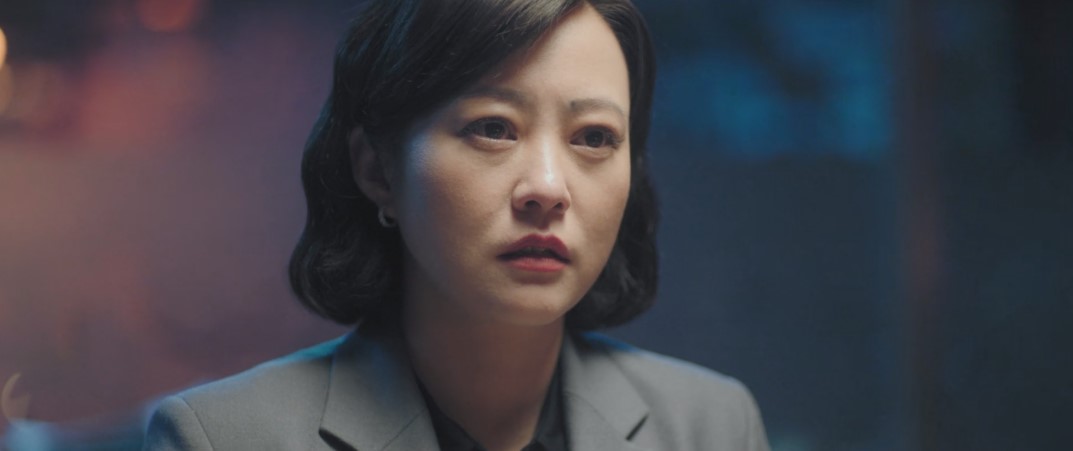
Zhang Chunmei (Hao Lei)
Misfortunes never come singly, once the marital crisis came, other crises followed suit. My mother-in-law suffers from Alzheimer's disease, she made a low-level mistake at work, and the position of editor-in-chief was preempted by others...
Laying out the predicament is mainly to describe people and their coping in the predicament. But to be honest, Zhang Chunmei is not as comfortable as the audience expected in the face of many difficulties. On the contrary, she is somewhat contradictory.
In some work-related occasions, the audience saw Zhang Chunmei, an independent and powerful modern woman. For example, at the beginning of the plot, Zhang Chunmei directly confronts the manufacturer of health care products on the TV show. You will think that she is sharp, straightforward, sober, and rational. Another example is that the magazine airborne a manager Su to make a special article on "mature elite women". Manager Su's definition of elite women is "good in the hall and good in the kitchen", and he thinks Zhang Chunmei is such a person. Zhang Chunmei refuted Manager Su, she believed that "since we want to redefine the theme of women, we should not define them anymore, we should break the original definition". From these points of view, Zhang Chunmei's concept of women is advancing with the times.
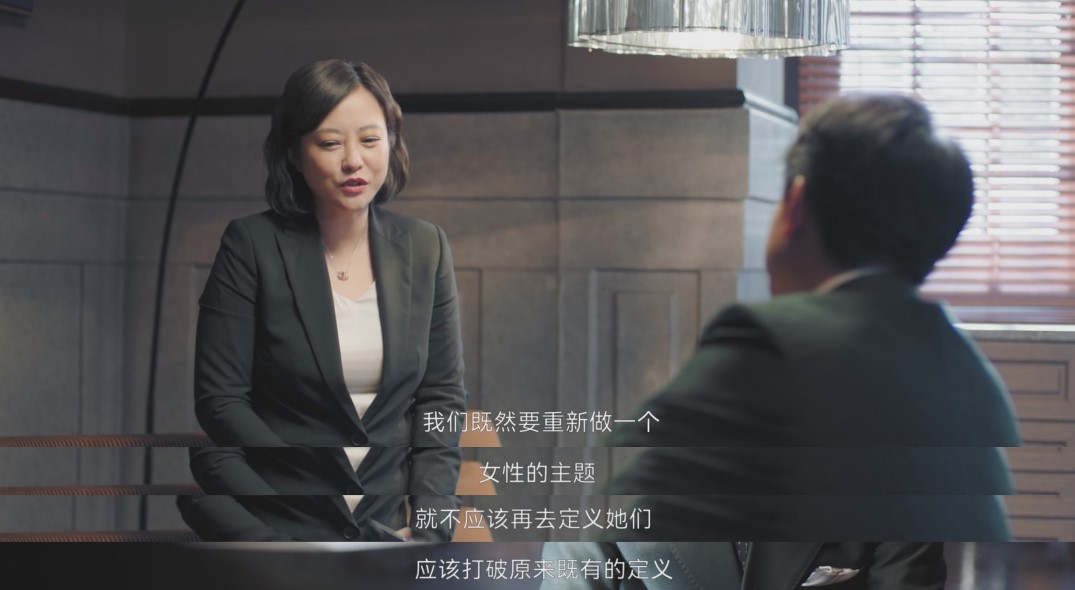
Zhang Chunmei is sometimes sober
But in real life, when Zhang Chunmei faced various difficulties, her response could hardly be said to reflect the characteristics of an independent woman.
For example, she is the "big head" of this big family, although it shows that she has strong ability to handle affairs, but sometimes we also think that what she replaces is just the position of "patriarchy", which is more or less "father-like", such as always Treat your husband like a child and help him settle everything.
When she found out that her husband's mental state might be wrong, she directly approached the female colleague who had an affair with her husband, and asked her to rescue Ni Weiqiang together with her (what is the reason for him); when she learned that her husband was falsely accused by the students, she directly called the students, Helping her husband settle this matter, the husband asked her "Why do you solve my own problems behind my back", and her answer was "Isn't that because you can't solve it?... I am your wife, okay? There are some problems It’s hard for you to say, when you can’t solve it, I have an obligation to help you solve it.”
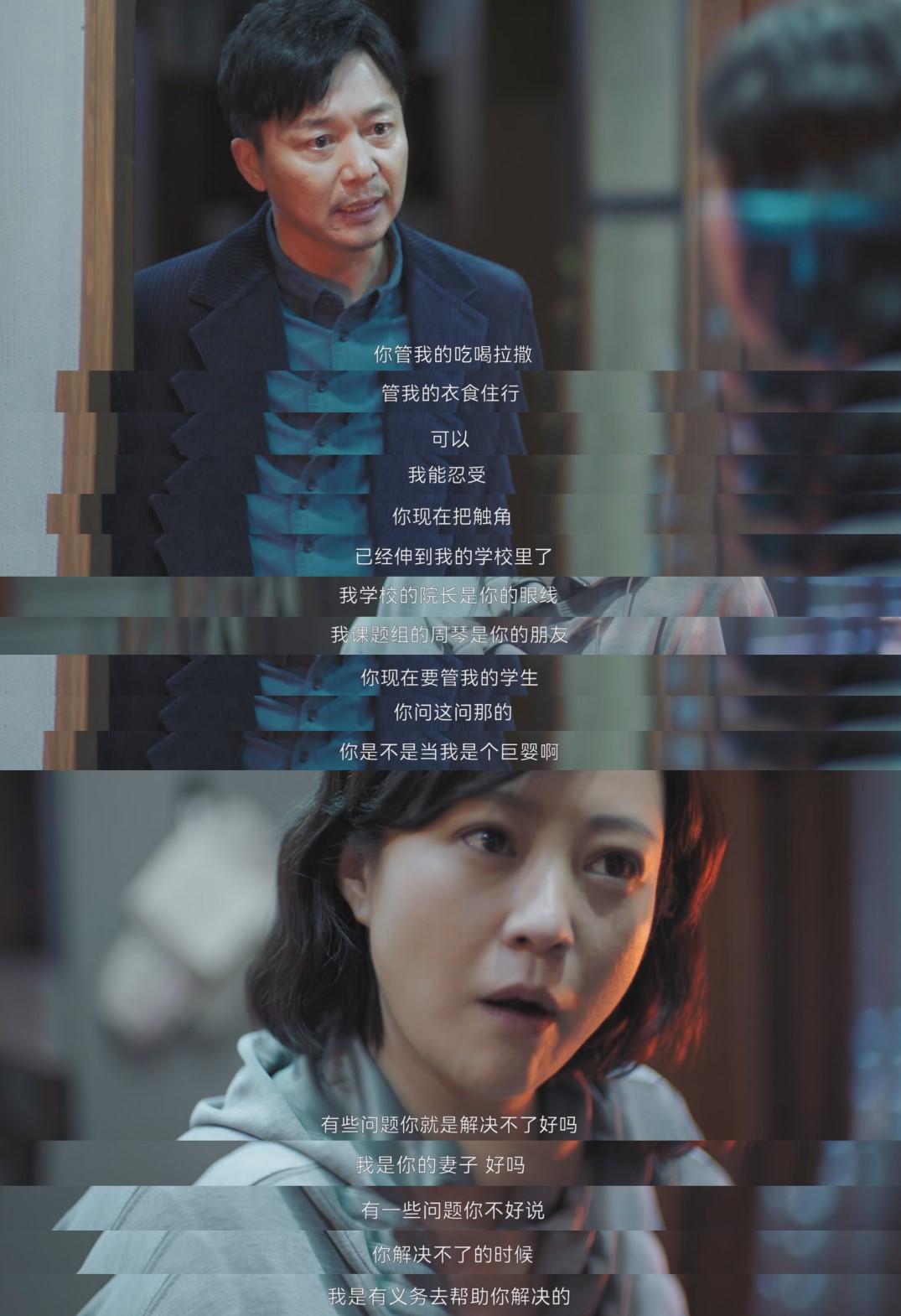
Zhang Chunmei's logic is very suffocating
Thinking in another way, your partner intervenes at any time to solve the problems in your workplace, and thinks it is your "obligation". Isn't this kind of love really a hidden desire for control? And after divorcing her husband, Zhang Chunmei's desire for control extended to her son, and it will be her son who will collapse in the future.
Faced with her husband's divorce, we can understand Zhang Chunmei's hesitation and reluctance. After all, the two have come from school days and have a deep relationship. It is normal for independent women to hesitate in emotional choices. It's just that Zhang Chunmei didn't want to divorce at first, even if she suspected that her husband might have someone else, she had to make do with it. The insinuations in the play continue to strengthen the concept of "women don't want divorce". For example, Zhang Chunmei's best friend said, "There are not many lice under the robe of marriage. If you can bear it, bear it. You see, I am very happy to go to work every day. , but do you know how many times I cried when I was alone at home?" Zhang Chunmei listened to her best friend's complaints with a heavy face, and she didn't intend to refute.
Moreover, compared to her career, Zhang Chunmei also spends more time on her family, and she spends her working hours on family matters, which leads to low-level mistakes in the magazine (possibly framed), and the loss of important advertisers (hope for forgiveness from customers) , I don’t see what she can do); when I was in a meeting in another place, I knew that my husband had sent my mother-in-law to a nursing home, so I rushed back immediately... The audience really couldn’t tell what kind of "enterprise" she had, and her attitude towards new media was also conservative and negative. In contrast, competitors can fight more than her.
In short, Hao Lei's acting skills are of course not a problem, but as the backbone of the plot, the split of Zhang Chunmei's role sometimes makes the audience wonder how to substitute her. The screenwriter did not unify her contradictory two sides well.
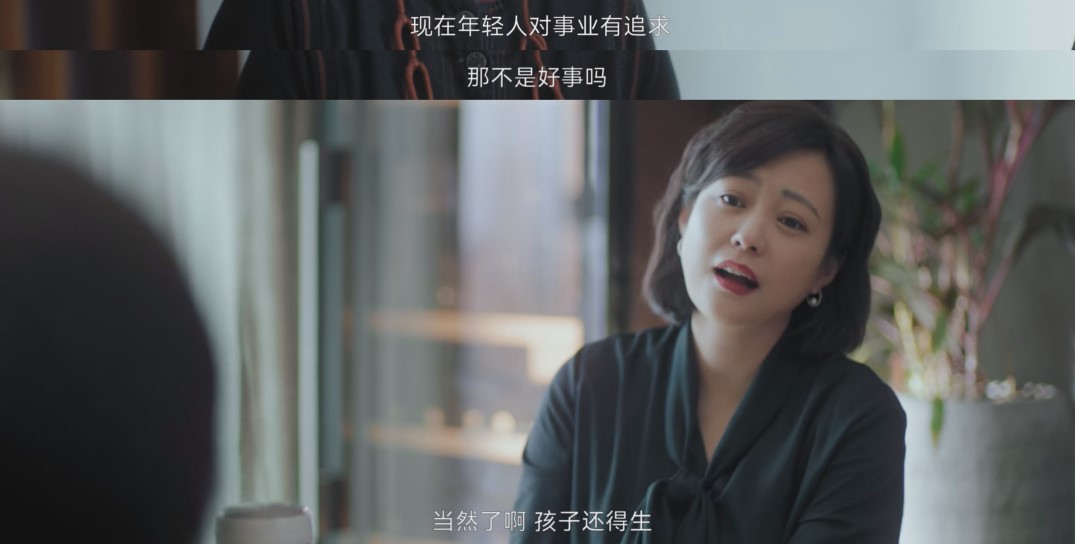
There are some contradictions in the character of Zhang Chunmei
The line of the third sister played by Wang Ou, her "sibling love" with former athlete He Zhichao (played by Pang Hanchen), is more of the rhythm of urban idol dramas, and it is also a common "flavoring agent" in family life dramas. Nothing. As for the role of "little aunt" derived from He Zhichao's branch line, it is a typical behavior of bluntly placing roles for "relationship households", which has been scolded by the audience.
Fortunately, "Mature Years" also has the second Hu "Song Dandan". "Mature Years" can maintain a good viewability, and it depends on Erhu's line to retain the "soul" of family life dramas.
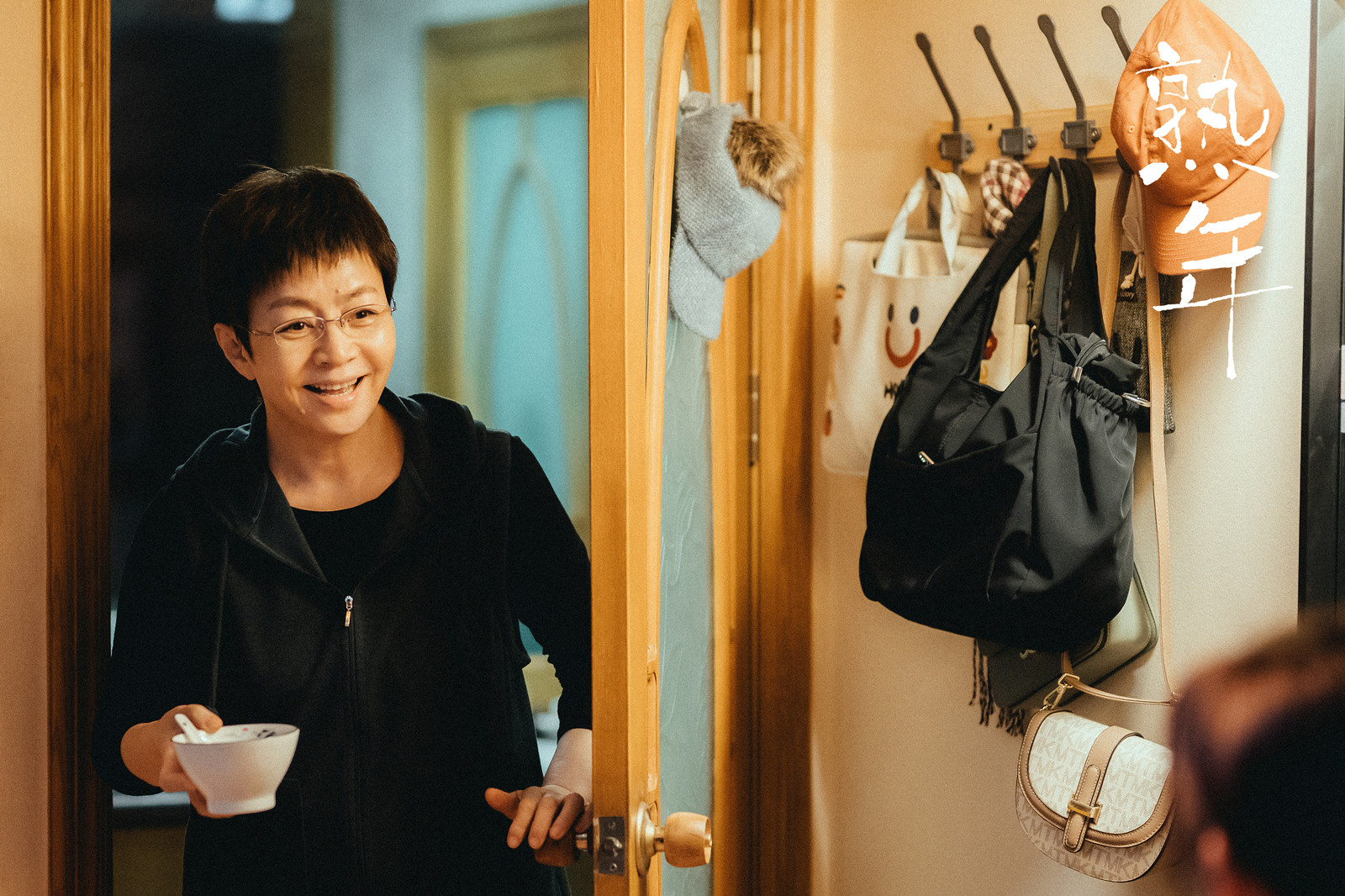
Wu Erhu (played by Song Dandan)
The biggest characteristic of Erhu is "philistine vulgarity". What I believe in in my mind is mainly the clichés of rules and regulations, snobbery, love of money, greed for petty gains, and keen calculation.
For example, from the standpoint of the daughter-in-law Liu Hongyan, this mother-in-law is simply the best mother-in-law in previous dog blood family dramas, which is suffocating. Erhu didn't agree with his son's marriage at first, because Liu Hongyan's registered permanent residence is out of town, and his family background is also very ordinary. The son lied to him that his wife was pregnant, so Erhu agreed to the marriage. Afterwards, Er Hu began to chase after her daughter-in-law to register for a prenatal checkup. After learning that her daughter-in-law was a fake pregnancy, she was furious in front of her face: her son and "outsiders" were lying to her, so he shouldn't have agreed to the marriage at that time.
But now that they are all married, Er Hu changed her strategy and began to give birth in various ways. I made aromatherapy, and said that after the ancient emperor smoked it, the desire was very strong, so I asked my son and daughter-in-law to smoke it quickly, so as to have a grandson; I took away all the cosmetics of the daughter-in-law without authorization, because the reason is that cosmetics cannot be used for pregnancy...
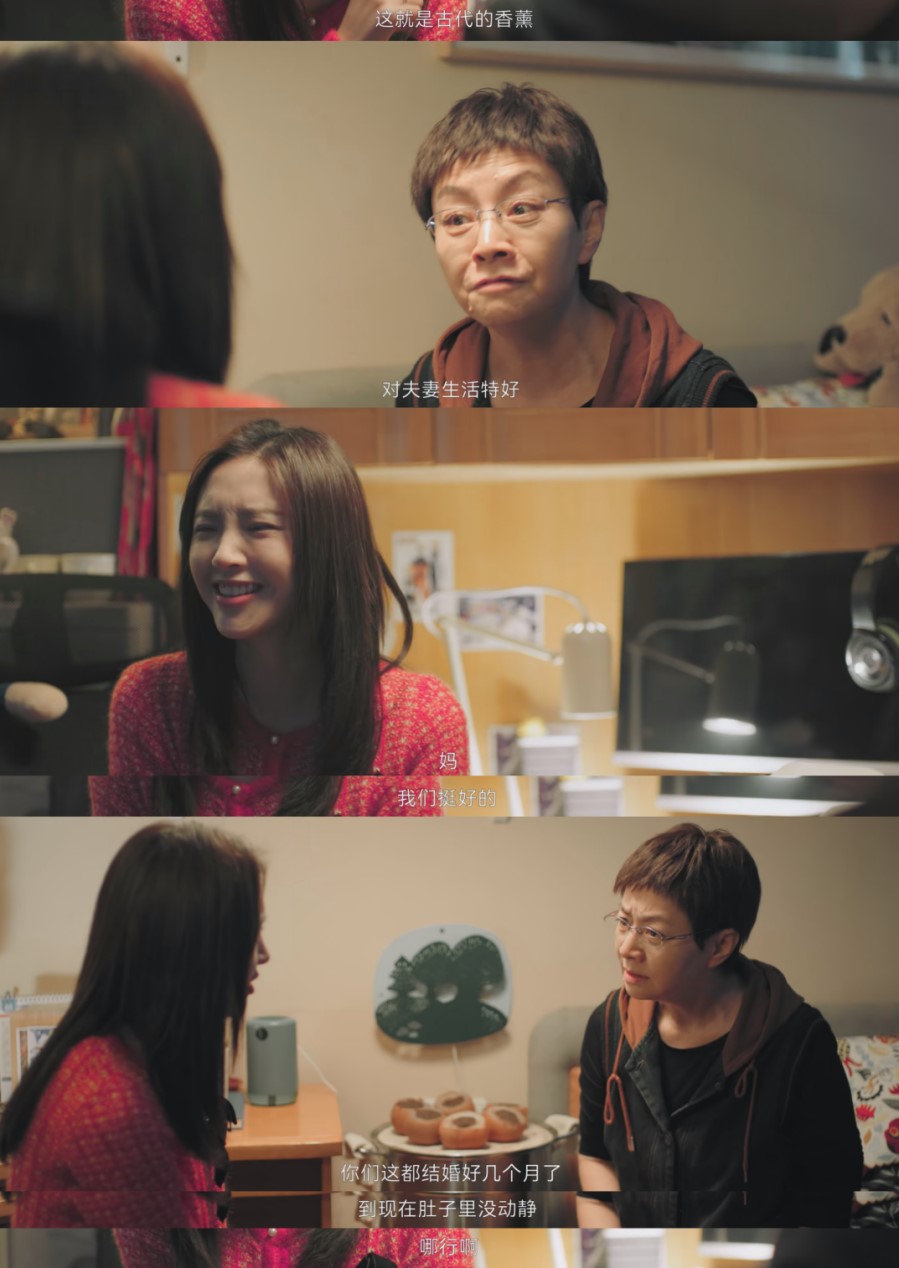
This mother-in-law is also a bit suffocating
Erhu originally promised his son and daughter-in-law that Liu Hongyan would buy them a house as soon as she became pregnant, but after Liu Hongyan became pregnant unexpectedly, Erhu immediately changed her mind and secretly told her husband, "I can't buy it right away. The child is not ready yet. I just got pregnant. Why do you have to sit down on the baby, at least three or four months, when the belly is full, let's think about buying a house." So, she found various reasons to shirk.
After Liu Hongyan had a miscarriage, her first reaction was not to feel sorry for her daughter-in-law, but to complain to her husband in private about her son’s failure to live up to expectations. At that time, she had to marry Liu Hongyan. What is the belief, this house is absolutely unacceptable, and I can't give birth to offspring, so where can I buy a house for you."
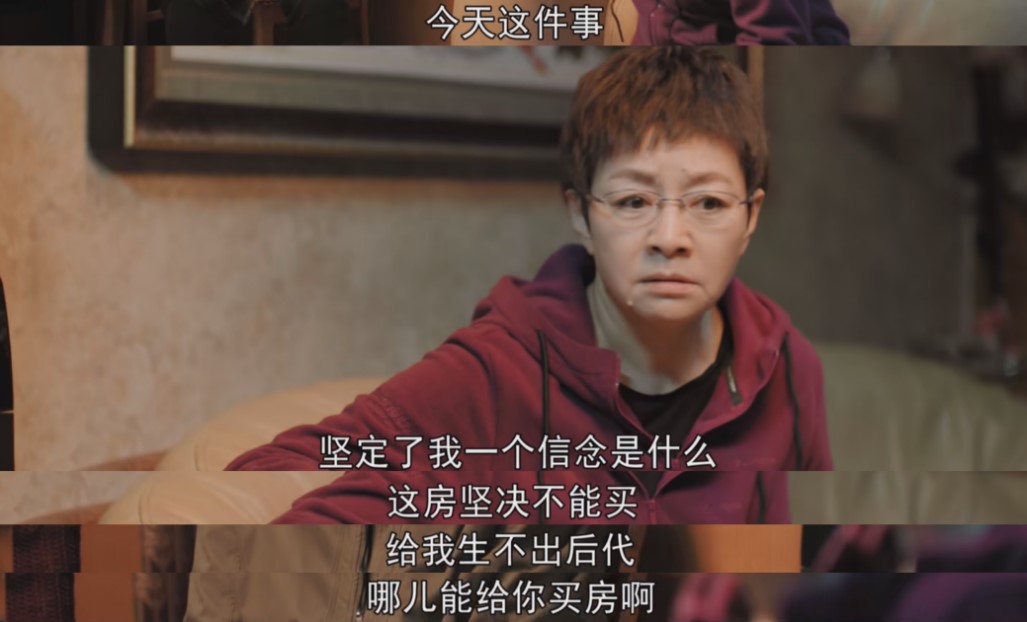
Daughter-in-law had a miscarriage, but Er Hu was calculating these things in private
Liu Hongyan has a really nice personality, at first she just smiled awkwardly and politely when faced with her mother-in-law's weird behavior. But once similar things accumulate, can the relationship between mother-in-law and daughter-in-law be good? In the future, there will definitely be turmoil between mother-in-law and daughter-in-law.
Such Erhu is really annoying and not pleasing. But how to put it, at least she is logically consistent. She is a real person, and her philistine vulgarity has a realistic reason-of course it does not mean that we agree with her reason-that is, Erhu's family is really difficult.
Unlike the second brother who is a university professor, younger brother and sister who are the deputy editors of a magazine, the third sister who is a TV producer, her second brother who is a salesperson in a supermarket, and her husband who is a cook, she is just an ordinary citizen. The series repeatedly photographed Erhu's home, the first floor of the "old broken small" community, with a small area and four people living there. Usually, when my husband goes to the toilet early in the morning, he always runs outside to the toilet.
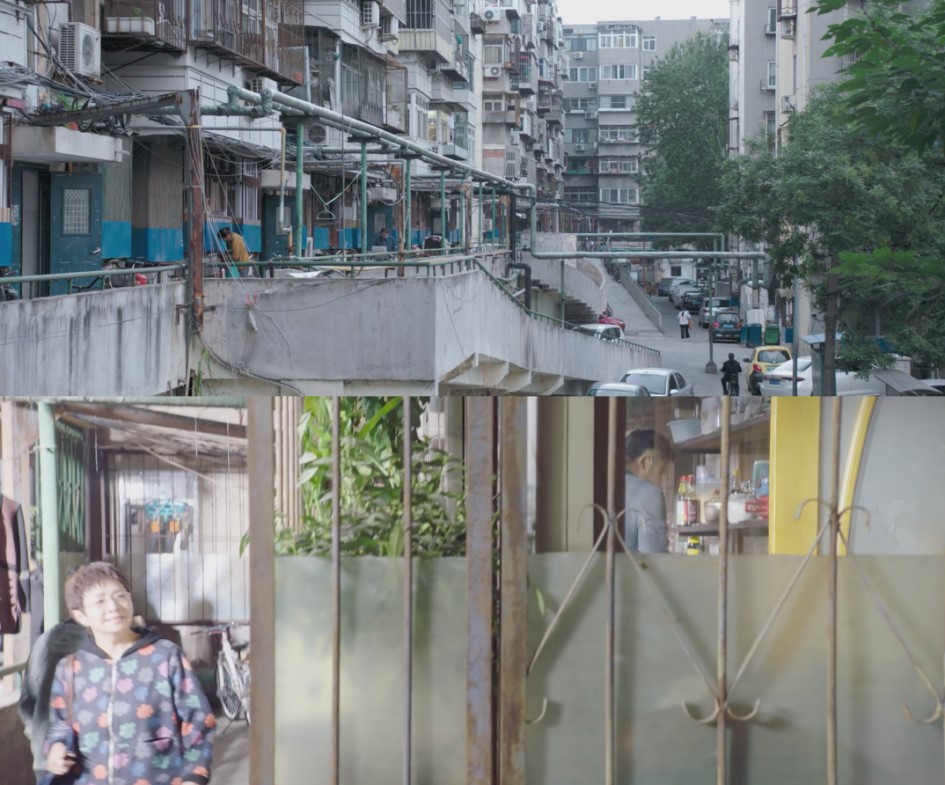
Erhu's house is very ordinary
The family went to the old lady's birthday party. The husband wore the suit that was left over from his second brother's, and Erhu wore the clothes given by his younger brother. Er Hu felt awkward at first, but soon thought about it, "Maybe he will send us off next time."
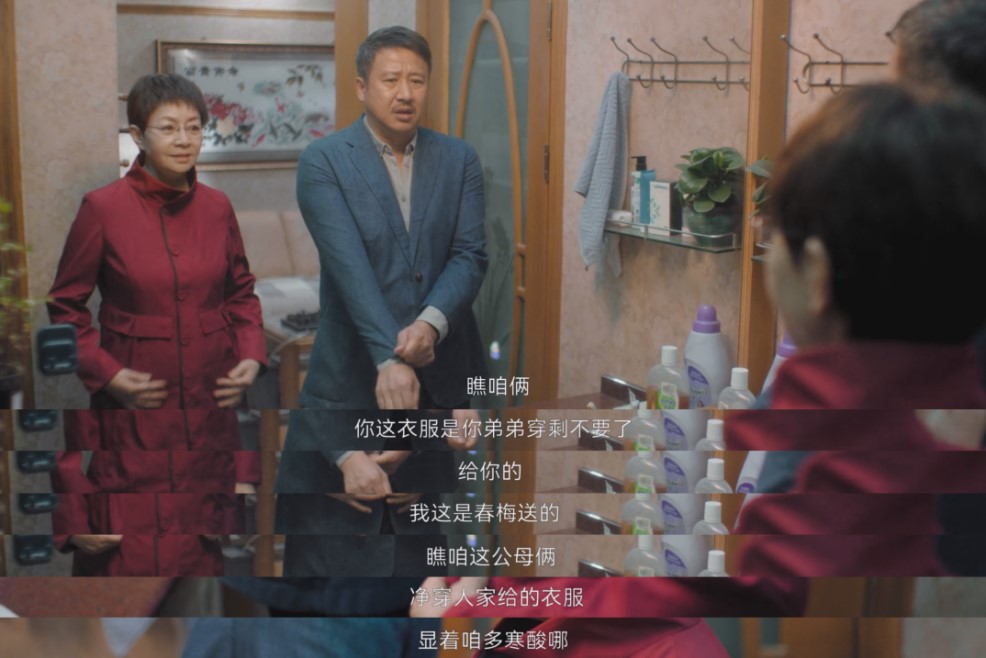
Wearing old clothes of younger siblings
In short, Erhu's philistines have real difficulties. They are afraid of being poor, have no big money, and their mother-in-law is also "partial" (for example, the third daughter lives alone in her mother-in-law's big house, and Erhu's family squeezes into a small house), so all kinds of tricks Search calculations. For such a big event as her son's buying a house, she kept her wallet tight. After all, the house bought by her son after marriage belongs to the joint property of the husband and wife.
But Erhu is not one-sided and the best, and the plot also shows the warm background that Erhu once had. Once she mentioned that when she was just married, her husband said that her eldest brother was like a father, and that she had to pay for the living expenses of her younger brother who was studying in college every month. "I married you from the bottom of my heart, and all I think about is this family." At the beginning, it was the "everyone", and later everyone had their own small family. What Erhu thought of was his own "small family", After all, the life of the second brother and the third sister is much better than theirs, and their family is the "lowest ordinary people", so what if she tried her best to fight for this small family?
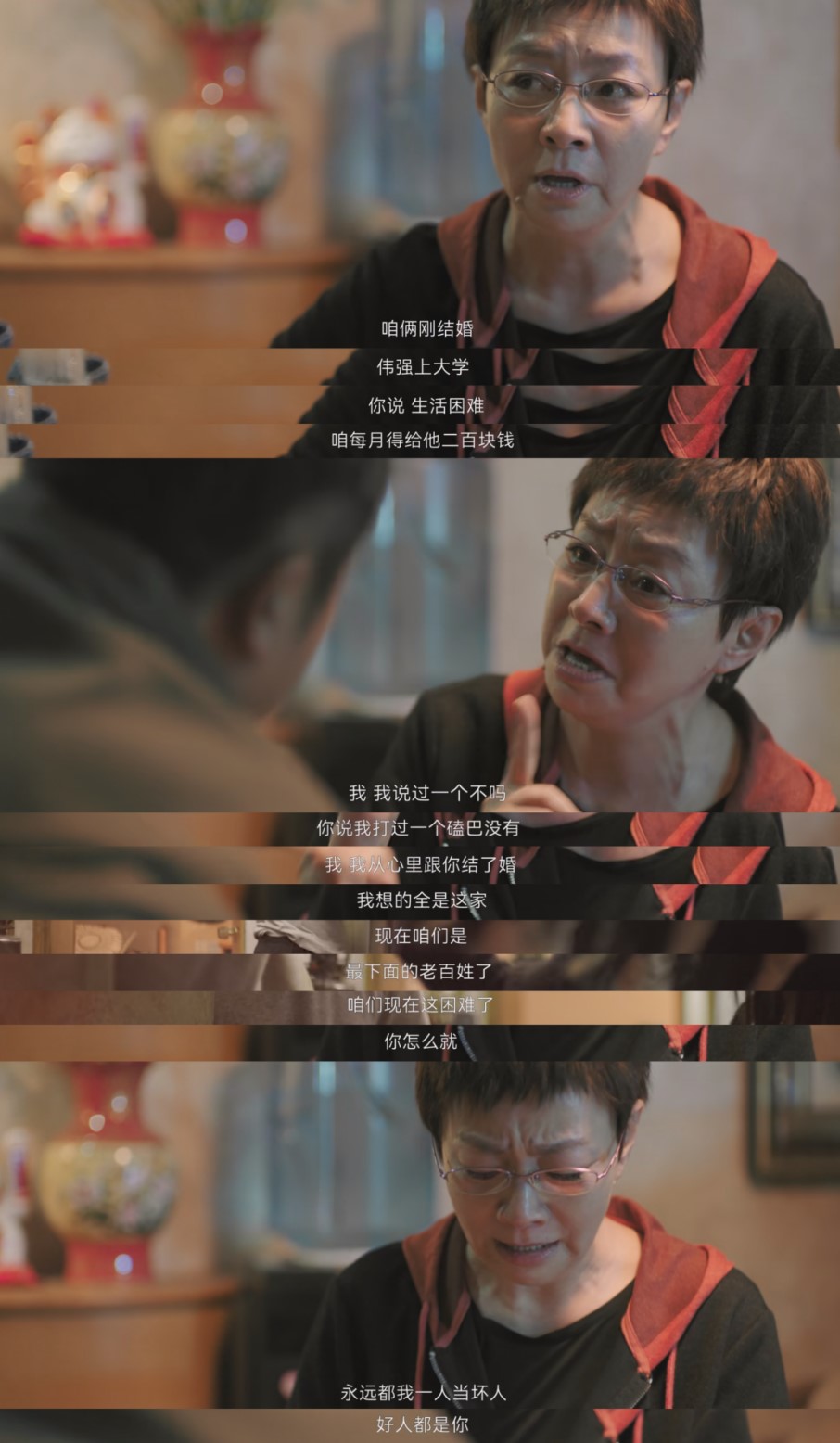
Er Hu does have her difficulties
Many people say that family life dramas are easy to write, trivial, chicken-flying and dog-jumping, and the accumulation of various bloody plots is not afraid that the plot will not be able to move forward. But it is not easy to write. Because the complexity of the family lies in that on the one hand, we have selfish desires and personal pursuits, but on the other hand, we cannot get rid of the bondage of blood and family. Therefore, we may be selfish but can't bear it, we have complaints but also are willing, we have calculations and are willing to make sacrifices, we have hatred, but we can't let go of love...
It is this complexity that constitutes the complexity of the family, the complexity of our emotions towards the family and family members, and the "soul" of family dramas. Other characters remain to be seen, but at least Erhu allows us to get a glimpse of this complex existence.